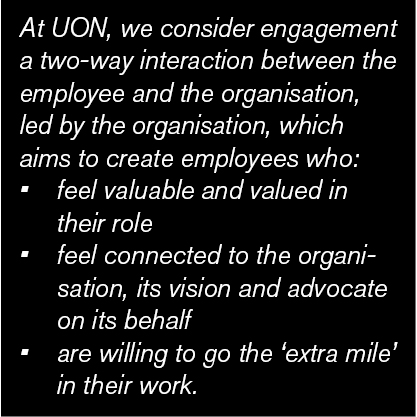Are you engaged?
Being connected to our colleagues, the organisation and what is going on around us is an increasingly important aspect of our working life. Engagement has proven links to innovation and is critically important when a workforce is impacted by change. It shows a direct correlation to performance and personal well-being.
“We know that engaging a diverse workforce such as ours is not straightforward. We are large, complex and geographically separated,” Tina Crawford, Deputy Director, Workforce Strategy and Transformation said.
“There is no one-size-fits-all solution.
“That said, engagement at its core it is quite simple. It is about having meaningful and productive dialogue across the organisation about the things that matter,” Tina said.
To that end, Resources Division took a new approach in response to their 2016 Your Voice results, engaging staff to analyse results and determine solutions to issues raised.
“Our Your Voice results were a point of departure for a dialogue with staff around the results,” Chief Operating Officer Nat McGregor said.
“We took the time to gain further insight into the top areas for improvement – rather than solutions being driven solely by management,” Nat said.
The collaborative approach has seen the Division make significant improvements in the early part of this year. The Division has been working with Human Resources to implement a new process for training and development that aligns to PRD and UON’s 70/20/10 development strategies; update position descriptions; and incorporate process improvement into PRD discussions.
Resources Division is also implementing a consistent project methodology in which staff are currently being trained and raised the visibility of the corporate plan by aligning Divisional objectives to staff PRDs.
“I’m really pleased with how effective this approach has been. By having the conversations, we are working on the things that matter most and are driving change as a team,” Nat said.
“We are off to a good start but it’s early days with a lot of work yet to do,” he said.
Similarly to Resources, the Faculty of Health and Medicine used Your Voice results from 2016 to engage staff through a series of roadshows across all of its sites and invite feedback and suggestions.
Input from these well attended forums has been rolled into corporate planning around staff engagement. The Pro Vice-Chancellor will be attending School based staff forums throughout 2017 enabling the transparent flow of communication from Executive to school and centre staff. This will be supported by an e-newsletter sent from the Pro Vice-Chancellor to staff every six weeks.
In response to feedback from clinical educators and conjoint staff regarding professional development opportunities, the Faculty of Health and Medicine also launched a Certificate in Clinical Teaching and Supervision in February. This is linked to a wider Academy of Clinical Educators to be launched mid-May.
In the Faculty of Education and Arts, where staff engagement is a key priority, a weekly Faculty e-newsletter (What's Happening in FEDUA) is distributed and a SharePoint site is in development. SharePoint will provide a centralised hub for strategic and operational plans, news and events, key announcements, latest achievements and online discussion forums on topical issues. A quarterly Faculty Communique has also been proposed as a means to capture and communicate the issues, decisions and actions arising from FEDUA governance committees.
The School of Education will pilot a Special Academic Relief Program where staff will be able to apply for a limited pool of marking relief and research assistance when key opportunities, such as external grant submissions, fall within core teaching periods.
In addition, FEDUA is exploring a range of strategies to enhance the effectiveness of PRD mentors through training and courses; aligning its reward and recognition scheme to the annual Vice-Chancellor’s Awards for Excellence; and will continue to introduce strategies to balance individual academic workload demands.
At the institutional level, in response to the recurring issues with communication and co-operation identified by Your Voice, an “audit” of our internal communications was undertaken with the report due imminently.
“After the work we did last year on our workplace culture, we felt it was the right time to fully understand what is working and what isn’t in terms of how and what we communicate broadly,” Tina Crawford said.
“Newer engagement channels such as the monthly Staff Collaboration Forum, the inaugural Staff Conference and ongoing Campus Conversations have been well received and attended and the support from members of our Executive Committee for these initiatives has been critical,” Tina said.
UON has used the Your Voice survey since 2007. It allows us to gauge staff perceptions on how we are tracking in different areas of the organisation and provides insights into how we benchmark against other universities.
Related news
- Shanae’s passion for caring delivers her dream to work in health
- Food and nutrition degree serves Keren a rewarding career
- Kicking goals on and off the field, Joeli proves you can do it all
- Proving age is just a number, Arlyn wants to inspire more women in their 50s to pursue education
- Sky’s the limit for graduates on the Central Coast
The University of Newcastle acknowledges the traditional custodians of the lands within our footprint areas: Awabakal, Darkinjung, Biripai, Worimi, Wonnarua, and Eora Nations. We also pay respect to the wisdom of our Elders past and present.